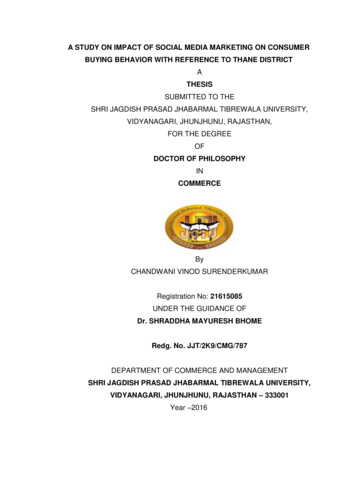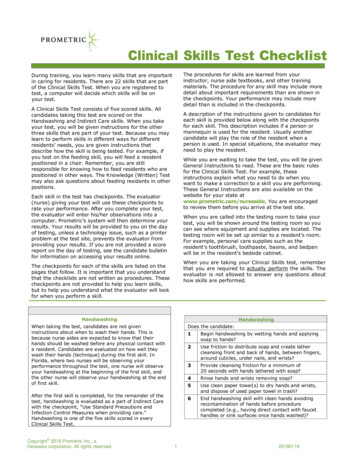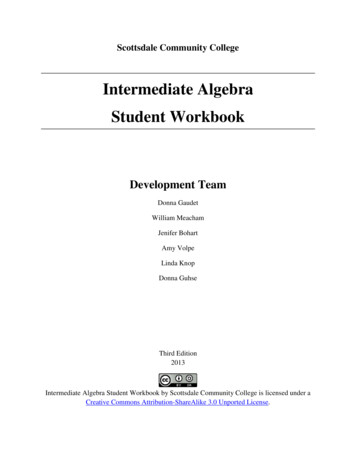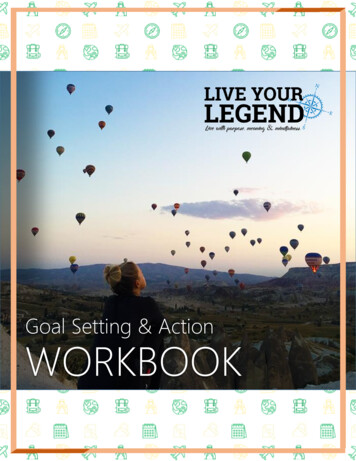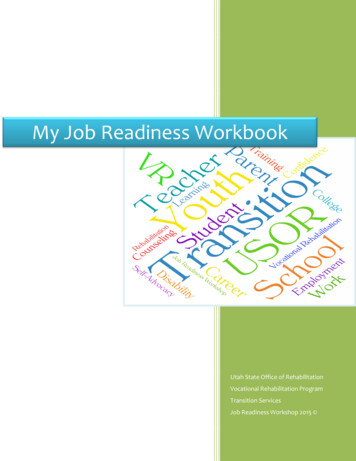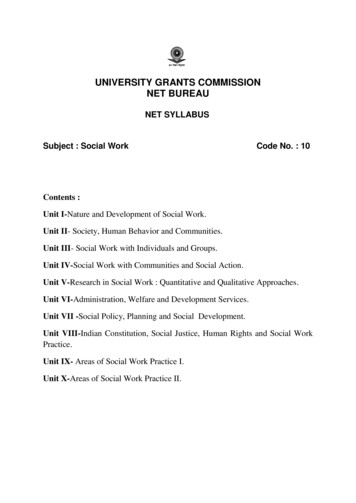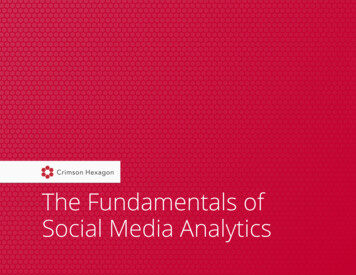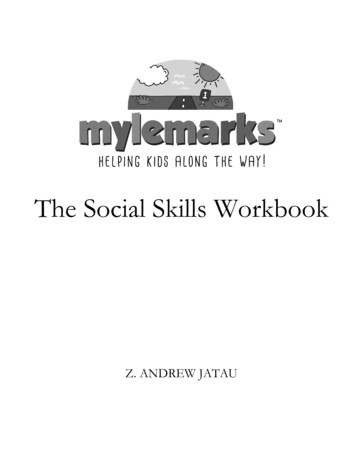
Transcription
The Social Skills WorkbookZ. ANDREW JATAU
Introduction . . . . . . . . . . . . . . . . . . . . . . . . . . . . . . . . . . . . . . . . . . . . . . . . . . . . . . . . . . . . . . 1Chapter 1: What are Social Skills? . . . . . . . . . . . . . . . . . . . . . . . . . . . . . . . . . . . . . . . . . . . . . 3Definition of Social Skills . . . . . . . . . . . . . . . . . . . . . . . . . . . . . . . . . . . . . . . . . . . . . . . . . . . . . . . . . . . . . . 4Good and Poor Social Skills. . . . . . . . . . . . . . . . . . . . . . . . . . . . . . . . . . . . . . . . . . . . . . . . . . . . . . . . . . . . 7Age Appropriate Behaviors . . . . . . . . . . . . . . . . . . . . . . . . . . . . . . . . . . . . . . . . . . . . . . . . . . . . . . . . . . . 15Chapter 2: Social Clues . . . . . . . . . . . . . . . . . . . . . . . . . . . . . . . . . . . . . . . . . . . . . . . . . . . . 19Facial Expression . . . . . . . . . . . . . . . . . . . . . . . . . . . . . . . . . . . . . . . . . . . . . . . . . . . . . . . . . . . . . . . . . . . 22Body Language . . . . . . . . . . . . . . . . . . . . . . . . . . . . . . . . . . . . . . . . . . . . . . . . . . . . . . . . . . . . . . . . . . . . . 25Personal Space . . . . . . . . . . . . . . . . . . . . . . . . . . . . . . . . . . . . . . . . . . . . . . . . . . . . . . . . . . . . . . . . . . . . . . 28Chapter 3: Talking and Listening . . . . . . . . . . . . . . . . . . . . . . . . . . . . . . . . . . . . . . . . . . . . 39Having a Conversation . . . . . . . . . . . . . . . . . . . . . . . . . . . . . . . . . . . . . . . . . . . . . . . . . . . . . . . . . . . . . . 40Active Listening . . . . . . . . . . . . . . . . . . . . . . . . . . . . . . . . . . . . . . . . . . . . . . . . . . . . . . . . . . . . . . . . . . . . 52Ending a Conversation . . . . . . . . . . . . . . . . . . . . . . . . . . . . . . . . . . . . . . . . . . . . . . . . . . . . . . . . . . . . . . . 61Chapter 4: Interacting with Others . . . . . . . . . . . . . . . . . . . . . . . . . . . . . . . . . . . . . . . . . . . 67Tips for Making Friends . . . . . . . . . . . . . . . . . . . . . . . . . . . . . . . . . . . . . . . . . . . . . . . . . . . . . . . . . . . . . . 74Peer Pressure . . . . . . . . . . . . . . . . . . . . . . . . . . . . . . . . . . . . . . . . . . . . . . . . . . . . . . . . . . . . . . . . . . . . . . . 76Working as a Team . . . . . . . . . . . . . . . . . . . . . . . . . . . . . . . . . . . . . . . . . . . . . . . . . . . . . . . . . . . . . . . . . 78Chapter 5: Handling Conflict . . . . . . . . . . . . . . . . . . . . . . . . . . . . . . . . . . . . . . . . . . . . . . 87Coping with Anger . . . . . . . . . . . . . . . . . . . . . . . . . . . . . . . . . . . . . . . . . . . . . . . . . . . . . . . . . . . . . . . . . . 91Being Assertive . . . . . . . . . . . . . . . . . . . . . . . . . . . . . . . . . . . . . . . . . . . . . . . . . . . . . . . . . . . . . . . . . . . . . 94Resolving Conflict . . . . . . . . . . . . . . . . . . . . . . . . . . . . . . . . . . . . . . . . . . . . . . . . . . . . . . . . . . . . . . . . . . . 99Chapter 6: Improving Social Skills . . . . . . . . . . . . . . . . . . . . . . . . . . . . . . . . . . . . . . . . . . . 105Identifying Positives . . . . . . . . . . . . . . . . . . . . . . . . . . . . . . . . . . . . . . . . . . . . . . . . . . . . . . . . . . . . . . . . 107Social Skills Checklist . . . . . . . . . . . . . . . . . . . . . . . . . . . . . . . . . . . . . . . . . . . . . . . . . . . . . . . . . . . . . . . 108Setting Goals . . . . . . . . . . . . . . . . . . . . . . . . . . . . . . . . . . . . . . . . . . . . . . . . . . . . . . . . . . . . . . . . . . . . . . 109
What are Social Skills?What are Social Skills?Social skills are the way that we behave and talk when we’re aroundothers. These things can have an impact on how other people feelabout us and how they treat us.People that display Good socialskills usually have pleasantinteractions with peers andadults. They are the type ofpeople that others enjoy beingaround because they are kindand polite. This leads to themhaving more and longer lastingfriendships. People with goodsocial skills know how to havegreat conversations and showothers that they are listening tothem and are interested in whatthey have to say.Someone with Poor social skills might have a hard time making and keeping friends. Alot of times, people don’t enjoying being around them because they might feel annoyed,unheard, or disrespected. People with poor social skills have a hard time understandinghow their actions impact others.A good way to help tell the difference between good and poor social skills is to askyourself this question:“Will what I’m about to do or say make this personwant to be around me or want to walk away?”If it will make the person want to walk away, then it is likely a poor social skill and youprobably shouldn’t do or say it!4
What are Social Skills?Hugo sees Colin playing with a brand-new toy robot. Hugo is jealous and really wantsto play with it, so he walks up to Colin and grabs the toy right out of his hands! IsHugo displaying Good or Poor social skills?GOODPOORWhy?How do you think it makes Colin feel?What do you think he’ll say or do to Hugo?DISCUSSION QUESTIONS1. If you checked Poor for any of these, what can each person do instead to make it Good?2. Have any of these situations ever happened to you? How did it make you feel?13
Social CluesAnswer the questions below about who you feel comfortable letting into yourdifferent personal space zones. Which zone do you allow your friends into? Whatabout teachers?Who is allowed in?Who is allowed in?Who is allowed in?DISCUSSION QUESTIONS1. What does it take for someone to be allowed into your Zone 1?2. What do you do if people in Zone 2 or 3, try to get into Zone 1?29
Social CluesVoice ToneSometimes it’s not what you say, but how you say something that can make all thedifference. Your tone of voice can let others know how you’re feeling in the moment.You could be saying the exact same sentence, but if you were to change your tone ofvoice, it would express different meanings. Look at the two examples below.Just don’t worry about it.Just don’t worry about it!If you look at the difference in social clues from both boys, you can guess that Boy #1 isfeeling sad and Boy #2 is angry. Even though they’re both saying the same thing, youcan imagine that their tone of voice and body language send a different message.SarcasmSarcasm is when someone says the opposite of what they really mean. When people usesarcasm, they usually change the tone of their voice. Sarcastic comments can be saidjokingly, and other times it can be used to be mean.For example, if you see your friend trip and fall in the hallway, and you walk up to themand ask, “Hey, how’s it going?” If they were being sarcastic, they might reply, “Great!This is the best day ever! Can’t you tell?”If you didn’t know that they were being sarcastic, you would be confused. That’s why itis important to listen to the tone of voice as well as other social clues.30
Talking and ListeningDoes this person look like they want to have a conversation?YESNOHow can you tell?How do you think this person is feeling?What might happen if you were to try to have a conversation with them?44
Talking and ListeningDISCUSSION QUESTIONS1. What are some situations where you have trouble starting a conversation?2. What do you think some good conversation starters would be in those moments?49
Talking and ListeningRead each comment and try to think of questions you can ask in response tokeep the conversation going.I’M REALLYLOOKINGFORWARD TOSPRING BREAKTHIS YEAR.55
Interacting with OthersPeer PressureSometimes people will pretend to be your friend in order to get you to do things that youknow are wrong. These kids will act nice to you sometimes, but other times they mightthreaten you or make fun of you if you don’t do as they say. These are not your friends!Peer pressure is when someone tries to convince you to do something you may not reallywant to do.How do you know if it’s peer pressure? Here are a few questions you can ask yourself.Have you ever experienced peer pressure before?76
Handling ConflictDISCUSSION QUESTIONS1. Have any of these examples ever happened to you? How did you resolve the conflict?2. What would Box 4 look like if the characters handled the conflict in an unhealthy way?103
Improving Social SkillsWhich skills do you think you need to improve? Place a check mark next to thesentence that is true for you.I have a hard time understanding how people are thinking or feeling.I don’t work well with other people.I can’t keep friends for a long time.I get easily distracted when I’m spoken to.I avoid talking to people because I don’t know what to say.People usually don’t laugh at my jokes.I can be a sore winner or a sore loser sometimes.I give into peer pressure pretty easily.I yell and scream, insult people, or throw things whenever I get mad.I don’t understand other people’s facial expressions and body language.People often tell me that I need to act my age.I say inappropriate things sometimes.I can’t keep a conversation going because I don’t know what to say.I rarely say “please”, “thank you”, or “excuse me”.I invade people’s personal space sometimes.I don’t know how to make friends.I’ve been told before that I have poor manners.I get nervous and anxious when I’m around other people.I don’t tell other people how I feel when I’m upset with them.I have a hard time controlling the volume of my voice.DISCUSSION QUESTIONS1. How many of the sentences did you check?2. Are you ready to do something to start improving your social skills?108
About the AuthorZ. Andrew Jatau, MS, has served diverse populations in his roles as acase manager, professional counselor, and adjunct professor. He hasdeveloped programs and presentations focused on helping children,teens, and young adults develop socially and emotionally. He is thefounder and CEO of Mylemarks LLC.For more helpful social-emotional resources and tools,visit www.mylemarks.com!
What are Social Skills? 4 What are Social Skills? people that others enjoy being Someone with Poor social skills might have a hard time making and keeping friends. A lot of times, people don’t en



